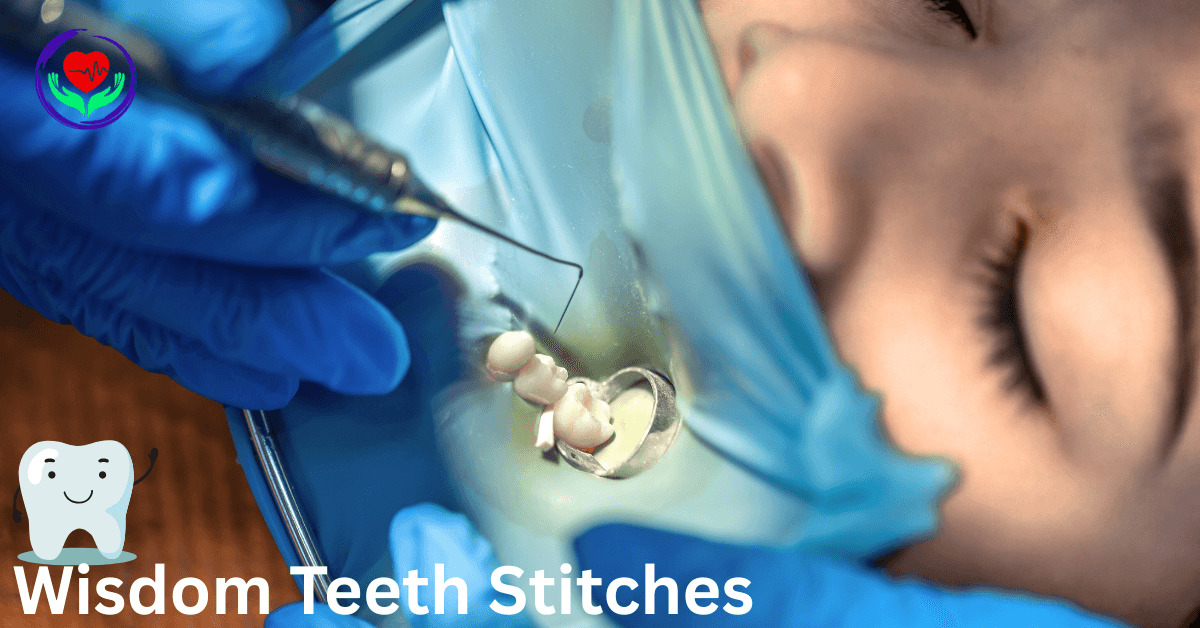When you are deciding to have your wisdom teeth removed, it feels like a relief until you’re left wondering about the stitches in your mouth. Wisdom Teeth stitches are a standard part of the healing process during the removal of wisdom teeth, but questions like how long they last, how to care for them, and what type you have are the top concerns of patients, which can leave many patients unsure.
In this comprehensive guide, we’ll break down everything you need to understand about stitches after wisdom teeth removal, including the mechanism of their working, when they dissolve (if at all), and how you can remove them to protect your healing gums. When there is a need to call your oral surgeon or dentist.
What Are Wisdom Teeth Stitches?
Wisdom teeth stitches (or sutures) are often placed after wisdom teeth extraction to help close the surgical site. It controls bleeding, and it also promotes the healing process. Whether or not you receive stitches it entirely depends on the complexity of the surgery.
Types of Wisdom Teeth Stitches:
| Stitch Type | Description |
| Dissolvable Stitches | Designed to break down and be absorbed by your body over 7–14 days |
| Non-Dissolvable Stitches | Must be removed by your dentist or oral surgeon, usually 7–10 days post-surgery |
| Self-dissolving Stitches | A subtype of dissolvable stitches; they melt away without needing removal |
Knowing which kind you have is essential—always ask your oral surgeon after the procedure.
How Long Do Wisdom Teeth Stitches Last?
It is one of the most common questions of every person who goes for wisdom teeth removal after surgery: how long do wisdom teeth stitches stay in?
- There is a need to dissolvable stitches usually fall out within 7–10 days, sometimes up to 14.
- There are some certain non-dissolvable stitches must be removed by a professional in about 7 days.
- You must be considering, early removal or loosening can happen, especially if post-surgery care isn’t followed.
If your wisdom teeth stitches came out too early or you monitor for bleeding or signs of dry socket and contact your dentist.
How to Care for Stitches After Wisdom Teeth Removal
Proper aftercare health procedure is crucial to avoid complications like infection or delayed healing mechanism. We are explaining entire details how to protect your wisdom teeth stitches:
Things to Do:
- There is an urgent need to rinse gently with warm salt water (avoid forceful spitting)
- You must be sticking to soft foods: mashed potatoes, smoothies, yogurt.
- You are dermatologically recommended to use prescribed pain medication or over-the-counter ibuprofen
- You are informed to apply a cold pack to reduce swelling
- There is an optional important choice to brush gently around the surgical site (avoid the stitches directly)
Thing not to Don’t:
- You are not supposed to use a straw (can cause dry socket by dislodging blood clots)
- You are advised to eat spicy, crunchy, or hot foods
- Do not smoke or vape at any cost
- Do not engage yourself in strenuous activity for at least 72 hours
What Is a Dry Socket?
Dry socket is one of the most painful complications in the procedure of teeth removal after wisdom teeth surgery. It occurs on real grounds when the protective blood clot is dislodged or fails to form, exposing the bone and nerves underneath.
Signs of Dry Socket:
- There are some severe throbbing pain 2–4 days after surgery
- There are some kinds of bad breath or foul taste
- It can be visible bone at the surgical site
- It can cause pain radiating to ear, jaw, or temple
If you are suspecting a dry socket,there is a dire need to call your oral surgeon immediately for treatment.
What Affects Healing Time?
While many people heal quickly, several factors can delay the process depending upon the following factors:
| Factor | Impact on Healing |
| Smoking or vaping | Slows healing, increases infection risk |
| Poor oral hygiene | Increases chance of infection |
| Not following aftercare | Can cause bleeding or suture disruption |
| Underlying conditions | Diabetes, autoimmune disorders may slow healing |
| Type of extraction | Complex surgeries (impacted teeth) take longer |
Medical Insight: What the Experts Say
According to the American Association of Oral and Maxillofacial Surgeons (AAOMS), there are certain patients who recover fully within 7–14 days with proper post-op care.
A 2020 study in the Journal of Oral and Maxillofacial Surgery showed the impactful results that dissolvable sutures resulted in similar healing rates compared to removable ones but on the other hand, post-operative compliance was the most critical factor in healing success in a true sense.
Real Patient Example
Case Study:
Jamie, 26, had all four wisdom teeth that were removed with dissolvable stitches. He followed every care instruction for this issue, but one stitch fell out early on day 3. He contacted his dentist, who reassured him that no dry socket had formed. Jamie healed completely by day 10.
Tools to Support Healing
To promote fast recovery, many dentists recommend the following tips:
- You can use irrigation syringes (for gentle rinsing after 5–7 days)
- Chlorhexidine mouthwash (if prescribed) can also be used
- Gauze pads (to control early bleeding)can be excellent choice
- Cold compresses (first 48 hours) are also an amazing offer
- Wisdom tooth aftercare kits (available on Amazon or in dental offices) are also recommended
When to Call Your Dentist
Contact your provider if you experience the given issues with your teeth removal procedure:
- The way when bleeding won’t stop after 12 hours
- Feeling of a sudden increase in pain after day 3
- Pus, swelling, or foul smell are also the exact signs
- Stitches hanging loosely or falling out early call your dentist early
Takeaway: What You Need to Remember
In addition to it, wisdom teeth stitches are a normal and important part of the healing process. Whether your stitches are dissolvable or not, there is a need to follow post-operative instructions is key to avoiding complications like dry socket or infection.
You must be very gentle with your mouth, avoid hard foods and suction. Always ask your oral surgeon if you’re unsure about your healing.
10 FAQs About Wisdom Teeth Stitches
1. Do all wisdom teeth removals require stitches?
Certainly not. Stitches are typically being used if the extraction was surgical or if the area needs help in closing.
2. How do I know if I have dissolvable stitches?
Ask your surgeon at the appropriate time as he will inform you about the exact way most dissolvable ones often feel thinner or more flexible.
3. What happens if my stitches fall out early?
There is a dire need to monitor for bleeding or dry socket signs. Call your dentist for evaluation.
4. Can I eat normally with stitches?
You must be sticking to soft foods for the first few days. Avoid crunchy or spicy foods.
5. Are dissolvable stitches better than removable ones?
They’re more convenient for most of the time but not necessarily better—each has pros and cons.
6. How do I clean my mouth after wisdom teeth surgery?
There is some kind of gently rinse with salt water and avoid brushing the stitches for the first few days.
7. Is it normal for stitches to feel tight or itchy?
Yes, it becomes very normal for stitches to feel mild irritation that is normal as the area heals.
8. When can I start using a straw again?
Wait for at least 7–10 days to avoid dry socket by using a straw again.
9. What color are dissolvable stitches?
They’re often clear, white, or light purple in their colors but color varies by their specific type.
10. Can I smoke if I have stitches in my mouth?
Not at all. Smoking drastically increases your risk of complications like dry socket.Hence, they can directly affect the healing process
Call to Action
If you’re in a situation of recovering from wisdom teeth removal, don’t guess your way through healing. There is a proper need to follow your surgeon’s aftercare plan, ask questions, and stay alert for signs of trouble.
Still need more recovery tips or product recommendations?
Visit our website Healthiestdays, for well-researched, medically approved, and careful knowledge about your health.








